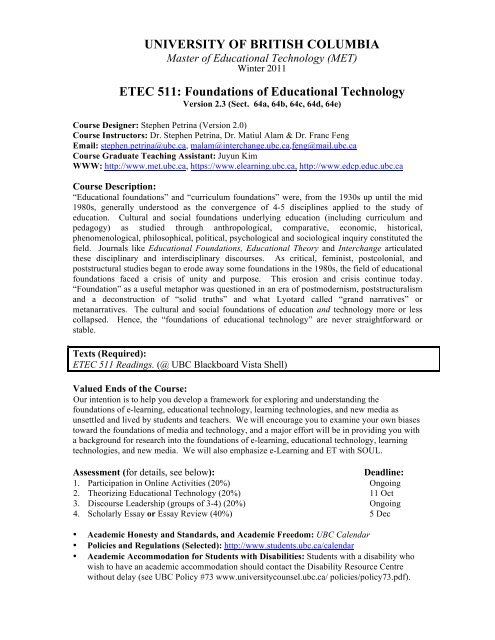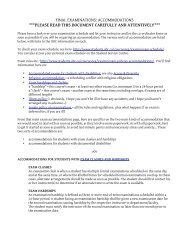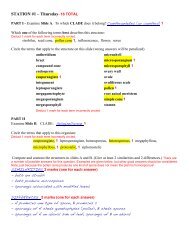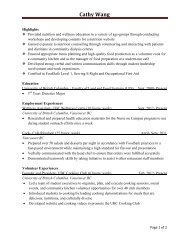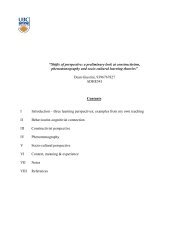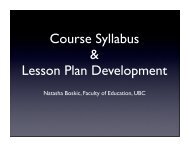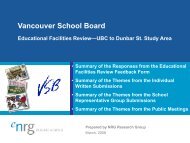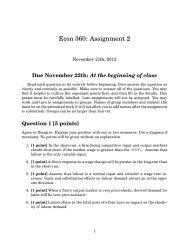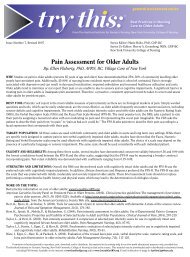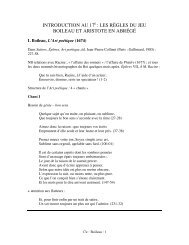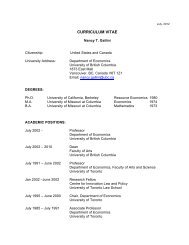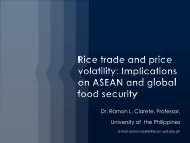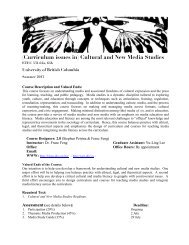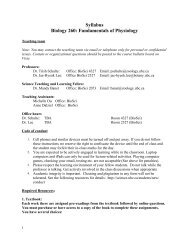ETEC 511 Syllabus (2011) - UBC Blogs - University of British ...
ETEC 511 Syllabus (2011) - UBC Blogs - University of British ...
ETEC 511 Syllabus (2011) - UBC Blogs - University of British ...
Create successful ePaper yourself
Turn your PDF publications into a flip-book with our unique Google optimized e-Paper software.
UNIVERSITY OF BRITISH COLUMBIA<br />
Master <strong>of</strong> Educational Technology (MET)<br />
Winter <strong>2011</strong><br />
<strong>ETEC</strong> <strong>511</strong>: Foundations <strong>of</strong> Educational Technology<br />
Version 2.3 (Sect. 64a, 64b, 64c, 64d, 64e)<br />
Course Designer: Stephen Petrina (Version 2.0)<br />
Course Instructors: Dr. Stephen Petrina, Dr. Matiul Alam & Dr. Franc Feng<br />
Email: stephen.petrina@ubc.ca, malam@interchange.ubc.ca,feng@mail.ubc.ca<br />
Course Graduate Teaching Assistant: Juyun Kim<br />
WWW: http://www.met.ubc.ca, https://www.elearning.ubc.ca, http://www.edcp.educ.ubc.ca<br />
Course Description:<br />
“Educational foundations” and “curriculum foundations” were, from the 1930s up until the mid<br />
1980s, generally understood as the convergence <strong>of</strong> 4-5 disciplines applied to the study <strong>of</strong><br />
education. Cultural and social foundations underlying education (including curriculum and<br />
pedagogy) as studied through anthropological, comparative, economic, historical,<br />
phenomenological, philosophical, political, psychological and sociological inquiry constituted the<br />
field. Journals like Educational Foundations, Educational Theory and Interchange articulated<br />
these disciplinary and interdisciplinary discourses. As critical, feminist, postcolonial, and<br />
poststructural studies began to erode away some foundations in the 1980s, the field <strong>of</strong> educational<br />
foundations faced a crisis <strong>of</strong> unity and purpose. This erosion and crisis continue today.<br />
“Foundation” as a useful metaphor was questioned in an era <strong>of</strong> postmodernism, poststructuralism<br />
and a deconstruction <strong>of</strong> “solid truths” and what Lyotard called “grand narratives” or<br />
metanarratives. The cultural and social foundations <strong>of</strong> education and technology more or less<br />
collapsed. Hence, the “foundations <strong>of</strong> educational technology” are never straightforward or<br />
stable.<br />
Texts (Required):<br />
<strong>ETEC</strong> <strong>511</strong> Readings. (@ <strong>UBC</strong> Blackboard Vista Shell)<br />
Valued Ends <strong>of</strong> the Course:<br />
Our intention is to help you develop a framework for exploring and understanding the<br />
foundations <strong>of</strong> e-learning, educational technology, learning technologies, and new media as<br />
unsettled and lived by students and teachers. We will encourage you to examine your own biases<br />
toward the foundations <strong>of</strong> media and technology, and a major effort will be in providing you with<br />
a background for research into the foundations <strong>of</strong> e-learning, educational technology, learning<br />
technologies, and new media. We will also emphasize e-Learning and ET with SOUL.<br />
Assessment (for details, see below):<br />
Deadline:<br />
1. Participation in Online Activities (20%) Ongoing<br />
2. Theorizing Educational Technology (20%) 11 Oct<br />
3. Discourse Leadership (groups <strong>of</strong> 3-4) (20%) Ongoing<br />
4. Scholarly Essay or Essay Review (40%) 5 Dec<br />
• Academic Honesty and Standards, and Academic Freedom: <strong>UBC</strong> Calendar<br />
• Policies and Regulations (Selected): http://www.students.ubc.ca/calendar<br />
• Academic Accommodation for Students with Disabilities: Students with a disability who<br />
wish to have an academic accommodation should contact the Disability Resource Centre<br />
without delay (see <strong>UBC</strong> Policy #73 www.universitycounsel.ubc.ca/ policies/policy73.pdf).
Grading Guidelines<br />
Approved July 2008<br />
A level - Good to Excellent Work<br />
A+ (90-100%) A very high level <strong>of</strong> quality throughout every aspect <strong>of</strong> the work. It shows the individual (or group) has<br />
gone well beyond what has been provided and has extended the usual ways <strong>of</strong> thinking and/or performing. Outstanding<br />
comprehension <strong>of</strong> subject matter and use <strong>of</strong> existing literature and research. Consistently integrates critical and creative<br />
perspectives in relation to the subject material. The work shows a very high degree <strong>of</strong> engagement with the topic.<br />
A<br />
(85-89%) Generally a high quality throughout the work. No problems <strong>of</strong> any significance, and evidence <strong>of</strong> attention<br />
given to each and every detail. Very good comprehension <strong>of</strong> subject and use <strong>of</strong> existing literature and research. For the<br />
most part, integrates critical and creative perspectives in relation to the subject material. Shows a high degree <strong>of</strong><br />
engagement with the topic.<br />
A- (80-84%) Generally a good quality throughout the work. A few problems <strong>of</strong> minor significance. Good comprehension<br />
<strong>of</strong> subject matter and use <strong>of</strong> existing literature and research. Work demonstrates an ability to integrate critical and<br />
creative perspectives on most occasions. The work demonstrates a reasonable degree <strong>of</strong> engagement with the topic.<br />
B level - Adequate Work<br />
B+ (76-79%) Some aspects <strong>of</strong> good quality to the work. Some problems <strong>of</strong> minor significance. There are examples <strong>of</strong><br />
integrating critical and creative perspectives in relation to the subject material. A degree <strong>of</strong> engagement with the topic.<br />
B<br />
(72-75%) Adequate quality. A number <strong>of</strong> problems <strong>of</strong> some significance. Difficulty evident in the comprehension <strong>of</strong><br />
the subject material and use <strong>of</strong> existing literature and research. Only a few examples <strong>of</strong> integrating critical and creative<br />
perspectives in relation to the subject material. Some engagement with the topic.<br />
B- (68-71%) Barely adequate work at the graduate level.<br />
NOTE: For <strong>UBC</strong>’s Faculty <strong>of</strong> Graduate Studies (FOGS), a final mark below 68% for Doctoral students and below 60%<br />
for Masters students is the equivalent <strong>of</strong> a Failing mark.<br />
C & D level - Seriously Flawed Work<br />
C<br />
(55-67%) Serious flaws in understanding <strong>of</strong> the subject material. Minimal integration <strong>of</strong> critical and creative<br />
perspectives in relation to the subject material. Inadequate engagement with the topic. Inadequate work at the graduate<br />
level.<br />
D level<br />
D (50-54%)<br />
F level - Failing Work<br />
F (0-49%)<br />
2
<strong>ETEC</strong> <strong>511</strong> Course Schedule & Readings:<br />
Each module generally consists <strong>of</strong> activities, readings, chat and discussion. Readings for each<br />
module include a balance <strong>of</strong> activities, <strong>of</strong>ten supplemented by image and sound resources.<br />
Date Module Assignments Live Forum Themes & Topics<br />
Week 1<br />
6-10 Sept<br />
#1 Course &<br />
WebCT Intro<br />
Course introduction,<br />
Online connections,<br />
Mapping & Definitions<br />
Week 2<br />
11-17 Sept<br />
#2 Vancouver Time<br />
TBA<br />
Philosophy <strong>of</strong> Educational<br />
Technology<br />
Technical-Empirical Dimensions <strong>of</strong> Educational Technology<br />
Week 3<br />
18-24 Sept<br />
#3 Vancouver Time<br />
TBA<br />
Design <strong>of</strong> Educational<br />
Technology<br />
Week 4<br />
25 Sept-1 Oct<br />
#4 Vancouver Time<br />
TBA<br />
Ethics & Jurisprudence <strong>of</strong><br />
Educational Technology<br />
Ethical-Personal & Socio-Political Dimensions <strong>of</strong> Educational Technology<br />
Week 5<br />
2-8 Oct<br />
#5 Vancouver Time<br />
TBA<br />
Anthropology & Sociology<br />
<strong>of</strong> Educational Technology<br />
Week 6<br />
9-15 Oct<br />
#6 Theorizing ET<br />
due<br />
Vancouver Time<br />
TBA<br />
History <strong>of</strong> Educational<br />
Technology<br />
Week 7<br />
16-22 Oct<br />
#7 Vancouver Time<br />
TBA<br />
(Week 8) 23-29 Oct Reading Break<br />
Politics <strong>of</strong> Educational<br />
Technology<br />
Week 9<br />
30 Oct-5 Nov<br />
#8 Essay Proposal<br />
Due<br />
Vancouver Time<br />
TBA<br />
Psychology &<br />
Phenomenology <strong>of</strong><br />
Educational Technology<br />
Week 10<br />
6-12 Nov<br />
Week 11<br />
13-19 Nov<br />
Week 12<br />
20-26 Nov<br />
Week 13<br />
27 Nov-3 Dec<br />
#9 Vancouver Time<br />
TBA<br />
Economics <strong>of</strong> Educational<br />
Technology<br />
Ecological-Natural Dimensions <strong>of</strong> Educational Technology<br />
#10 Vancouver Time<br />
TBA<br />
Ecology <strong>of</strong> Educational<br />
Technology<br />
Existential-Spiritual Dimensions <strong>of</strong> Educational Technology<br />
#11 Vancouver Time<br />
TBA<br />
Spirituality <strong>of</strong> Educational<br />
Technology<br />
(Week 13) Scholarly Essays & Essay Reviews<br />
-<br />
Scholarly Essay<br />
Course Feedback<br />
Due<br />
3
Module 1<br />
Introduction / The Definition <strong>of</strong> Educational Technology:<br />
Grand and not so Grand Narratives<br />
Readings / Media:<br />
1. Januszewski, A. (2001). Educational technology: The development <strong>of</strong> a concept. Englewood,<br />
CO: Libraries Unlimited.<br />
2. Dorbolo, J. (2004). Review <strong>of</strong> Educational technology: The development <strong>of</strong> a concept. Ethics<br />
and Information Technology, 5(1), 68-70. Library Portal Access.<br />
3. Loh, C. S. (2007). A suitable textbook for the classroom. However… Review <strong>of</strong> the SAGE<br />
handbook <strong>of</strong> e-learning research. Educational Researcher, 36(9), 573-578. Library Portal<br />
Access. See also http://www.odlqc.org.uk/n19-e.htm.<br />
4. Scanlon, I. (2002). Educational technology: The influence <strong>of</strong> theory. Journal <strong>of</strong> Interactive<br />
Media in Education, 6, 1-19. Library Portal Access.<br />
5. Petrina, S. & Feng, F. (2008). Primer for defining and theorizing technology in education, pt.<br />
1. Vancouver, BC: Tech no-Printing Press. See module 1.<br />
Module 2<br />
The Philosophy <strong>of</strong> Educational Technology:<br />
Philosophical Foundations<br />
Readings / Media<br />
1. Knowlton, E. (1992). The hand and the hammer: A brief critique <strong>of</strong> the overhead projector.<br />
Feminist Teacher, 6(2), 21-23, 41. Library Portal Access.<br />
2. Adams, C. (2008). The poetics <strong>of</strong> PowerPoint. Explorations in Media Ecology, 7(4), 283–<br />
289. Library Portal Access.<br />
3. Tufte, E. R. (2003, September). PowerPoint is evil. Wired, 11(9).<br />
4. Heidegger, M. (1953/1977). The question concerning technology. In M. Heidegger, The<br />
question concerning technology and other essays (trans. W. Lovitt) (pp. 3-35). New York:<br />
Harper & Row.<br />
Technical-Empirical Dimensions <strong>of</strong> Educational Technology<br />
Module 3<br />
The Design <strong>of</strong> Educational Technology:<br />
Curriculum and Instructional Design Foundations<br />
Readings / Media<br />
1. Mayer, R. A. (2003). Elements <strong>of</strong> a science <strong>of</strong> e-learning. Journal <strong>of</strong> Educational Computing<br />
Research, 29(3), 297-313. Library Portal Access.<br />
2. Kozma, R. B. (1994). Will media influence learning? Reframing the debate. Educational<br />
Technology Research and Development, 42(2), 7-19. Library Portal Access.<br />
3. Clark, R. E. (1994). Media will never influence learning. Educational Technology Research<br />
and Development, 42(2), 21-29. Library Portal Access.<br />
Module 4<br />
The Ethics & Jurisprudence <strong>of</strong> Educational Technology:<br />
Legal Foundations<br />
Readings / Media<br />
1. Philip, K. (2005). What is a technological author? The pirate function and intellectual<br />
property. Postcolonial Studies, 8(2), 199-218. Library Portal Access.<br />
4
Ethical-Personal & Socio-Political Dimensions <strong>of</strong> Educational Technology<br />
Module 5<br />
The Anthropology & Sociology <strong>of</strong> Educational Technology:<br />
Cultural and Social Foundations<br />
Readings / Media<br />
1. Monahan, T. (2005). Technological cultures. In Globalization, technological change and<br />
public education (pp. 73-92). New York: Routledge.<br />
2. Petrina, S. (2007). What is culture? Vancouver, BC: Tech no-Printing Press. See module 5<br />
(read only as reference).<br />
Module 6<br />
The History <strong>of</strong> Educational Technology:<br />
Historical Foundations<br />
Readings / Media<br />
1. Paul, R. (Executive Producer) & Petrina, S. (2002, October 11). The magic box: Technology<br />
in education (Sound Recording). Washington, D.C.: National Public Radio, Sound Prints. See<br />
module 6.<br />
2. McLuhan, M. (1967). The medium is the message. NEA Journal, 56(7), 24-27.<br />
3. Moody, K. (1999). The children <strong>of</strong> Telstar. New York: Vantage.<br />
Module 7<br />
The Politics & Political Economy <strong>of</strong> Educational Technology:<br />
Political Foundations<br />
Readings / Media<br />
1. Haraway, D. (1985). A manifesto for cyborgs. Socialist Review, 15(2), 65-107.<br />
Module 8<br />
The Psychology & Phenomenology <strong>of</strong> Educational Technology:<br />
Psychological & Phenomenological Foundations<br />
Readings / Media<br />
1. Turkle, S. (2004). Whither psychoanalysis in computer culture. Psychoanalytic Psychology,<br />
21(1), 16-30. Library Portal Access.<br />
2. Dall’Alba, G. & Barnacle, R. (2005). Embodied knowing in online environments.<br />
Educational Philosophy and Theory, 37(5), 719-744. Library Portal Access.<br />
Module 9<br />
The Economics <strong>of</strong> Educational Technology:<br />
Economic Foundations<br />
Readings / Media<br />
1. Puryear, J. M. (1999, September). The economics <strong>of</strong> educational technology.<br />
TechKnowLogia, 46-49.<br />
2. Lerner, J. & Triole, J. (2002). Some simple economics <strong>of</strong> open source. Journal <strong>of</strong> Industrial<br />
Economics, 50(2), 197-234. Library Portal Access.<br />
5
Ecological-Natural Dimensions <strong>of</strong> Educational Technology<br />
Module 10<br />
The Ecology <strong>of</strong> Educational Technology:<br />
Ecological Foundations<br />
Readings / Media<br />
1. Merchant, C. (2002). A conversation with Carolyn Merchant. California Monthly, 112(6).<br />
Library Portal Access.<br />
2. Zhao, Y. & Frank, K. (2003). Factors affecting technology uses in schools: An ecological<br />
perspective. American Educational Research Journal, 40(4), 807-840. Library Portal<br />
Access.<br />
Existential-Spiritual Dimensions <strong>of</strong> Educational Technology<br />
Module 11<br />
The Spirituality <strong>of</strong> Educational Technology:<br />
Spiritual Foundations<br />
Readings / Media<br />
1. Davis, E. (1993). Techgnosis: Magic, memory, and the angels <strong>of</strong> information. South Atlantic<br />
Quarterly, 92(4), 585-616. Library Portal Access.<br />
2. Feng, F. & Petrina, S. (2010). The flesh is willing but the spirit is weak. Unpublished<br />
manuscript. Introduction to Technology, Religion, Spirituality and the Sacred. See module<br />
11.<br />
Participation & Assignments<br />
Participation:<br />
Participation is valued at 20% <strong>of</strong> your final grade. We refer to the scholarly level <strong>of</strong> participation<br />
as academic conversation, which entails a variety <strong>of</strong> things including academic conversation,<br />
articulation and presentation. Participation is interdependent with preparation for each module,<br />
which involves reading (highlighting, pagination post-its, margin notes, comments & questions,<br />
etc.), writing (posting to discussions, note-taking, outlining, questioning, defining, mapping,<br />
framing, summarizing, journaling, blogging, podcasting, exposition, etc.), organizing<br />
(documenting, labeling, ordering, archiving, filing, sequencing events, chronicling, etc.),<br />
reflecting (rethinking, reincorporating, remapping, analyzing, synthesizing, etc.), and speaking<br />
(podcasting, corresponding with peers, chat, etc.). One goal <strong>of</strong> preparation is to sustain<br />
increasingly sophisticated academic conversations or engagement with the readings, course and<br />
peers. A second goal is to develop systematic approaches for engaging with the readings and<br />
your peers (i.e., developing reading, speaking, writing, organizing, and reflection form(at)s and<br />
styles that are effective). Read for Meaning along with Purpose…<br />
6
Participation<br />
Low------------Avg------------High<br />
Appropriately and accurately articulates key constructs and themes in readings, etc.<br />
1---------------3---------------5<br />
Reveals an attempt to synthesize knowledge <strong>of</strong> media and technology in education<br />
(readings, etc.).<br />
1---------------5.5--------------10<br />
Advances collective knowledge and consciousness by engaging with authors, peers,<br />
instructors in the online course<br />
1---------------3---------------5<br />
Total: xx / 20<br />
Assignments<br />
2. Theorizing Educational Technology (20%)— Theorize an application / app, artifact, device,<br />
technique, or process related to ET. Ideally, this would be the same or closely related to the topic<br />
chosen for the scholarly essay (see below). For help on the process <strong>of</strong> theorizing consult the<br />
Writing Guide for Graduate Students and read closely the way that Knowlton (1992) theorizes the<br />
overhead projector and how Adams (2008) and Tufte (2003; 2006) analyze PowerPoint. Modes<br />
<strong>of</strong> theory include comedy and tragedy, critique and deconstruction, myth and irony, or<br />
combinations. Hence, theory does not always reduce to critique and criticism.<br />
Include one toon / image (i.e., at least one ‘cell’) with the essay. Cartooning and spo<strong>of</strong>ing have<br />
always been a tradition or foundation <strong>of</strong> ET. For example, the Educational Technology Magazine<br />
ran a longstanding series <strong>of</strong> comics through the 1960s and 1970s and collated these in The<br />
Educational Technology Cartoon Book. Applications such as Comic Life, Toonlet (toonlet.com),<br />
and Pixton (pixton.com/ca/) make tooning ET not only possible but expected and essential. *See<br />
the images that accompany Knowlton (1992) and Tufte (2003; 2006).<br />
This essay should include a definition, explanation, development and details and, if applicable,<br />
examples. This is a common “pyramid structure” used in many encyclopedias. In the opening<br />
paragraph, the first few sentences clearly describe and define the topic and explain its importance<br />
to educational technology, e-learning, instructional design, etc.<br />
Keep the essay as jargon-free as possible. View this from a perspective <strong>of</strong> preparing a speech<br />
rather than writing an essay. In this way, we can describe complex issues in thoughtful ways<br />
without being needlessly complicated. Use direct quotations from other works sparingly but<br />
include citations <strong>of</strong> publications (e.g., APA citations, etc): If you must quote, please limit to one<br />
or two sentences or so and acknowledge the source (APA style). Focus on the topic and avoid<br />
digressions. Every word is important.<br />
Theorizing ET Essay Length: 700 words (e.g., 2 pages single-spaced + toon / image) (input into<br />
the Media Library and submit a note indicating completion to the Assignment Dropbox *with a<br />
MS Word or pdf file attached). Please be sure that your entry meets but does not exceed this<br />
word count. Word counts include the topic, your name, title, and references.<br />
7
Theorizing Educational Technology<br />
Low------------Avg------------High<br />
Clarity <strong>of</strong> Communication / Grammar / Style<br />
1---------------5.5---------------10<br />
Depth, Comprehensiveness & Substance <strong>of</strong> Theory & Toon<br />
1---------------5.5---------------10<br />
Total: xx / 20<br />
3. Scholarly Essay (40%)— Choose a topic that corresponds with one <strong>of</strong> the weekly topics (i.e.,<br />
foundations) or themes and write a scholarly paper exploring media and technology in education<br />
(i.e., apps, artifacts, devices, problems, processes, trends, etc.). The essay should provide a clear,<br />
cogent, concise exploration or case study <strong>of</strong> the topic (e.g., topics within or about e-learning,<br />
educational technology, learning technologies, ICT, new media, instructional design, curriculum<br />
design, etc.). Take a position (state a thesis or argument) and provide evidence, through examples<br />
and narrative, to support the position. Be creative and choose a topic that really interests you!<br />
At the 2/3-point <strong>of</strong> the course (Monday following the break), please also submit a *one page<br />
outline* <strong>of</strong> your paper as a work in progress. Outline = outline form. This includes the:<br />
1. Topic<br />
2. Theme and argument<br />
a. The argument or thesis<br />
b. The background<br />
3. Primary and Secondary sources for insight into the topic<br />
a. Issues to be addressed<br />
b. Literature to be consulted<br />
4. Provisional conclusions drawn from the argument & issues or data<br />
5. Structure / sections <strong>of</strong> the paper, etc.<br />
Assessment: (Limit to 10-12, tight well-written double-spaced pages including title page<br />
(limit to 3000 words + references) (upload to Assignment Dropbox and link to e-Portfolio).<br />
1. Clarity <strong>of</strong> communication / writing<br />
a. Is the writing clear and concise?<br />
b. Are the ideas focused and organized?<br />
2. Development <strong>of</strong> argument / thesis<br />
a. Is the argument coherent? Thoughtful? Analytical? Critical?<br />
Sophisticated?<br />
3. Exploration <strong>of</strong> content and theory<br />
a. Is there evidence <strong>of</strong> critically and theoretically exploring the issues?<br />
b. Are the ideas theorized, synthesized, extended or applied?<br />
4. Examples<br />
a. Are examples sufficient? Do examples ground the paper?<br />
b. Are there narrative examples?<br />
5. Grammar & Style<br />
a. Organization, sentence structure, paragraphs, spelling<br />
b. APA Style (format, references)<br />
8
Scholarly Essay<br />
Low------------Avg------------High<br />
Clarity <strong>of</strong> communication/writing<br />
1---------------5.5--------------10<br />
Development <strong>of</strong> argument / thesis<br />
1---------------3--------------5<br />
Exploration <strong>of</strong> content and theory<br />
1---------------5.5--------------10<br />
Provision <strong>of</strong> effective and sufficient examples<br />
1----------------5.5---------------10<br />
Total: xx / 40<br />
Grammar & Style<br />
1----------------3---------------5<br />
or Essay Review (40%)— Choose a topic that corresponds with one <strong>of</strong> the weekly topics (i.e.,<br />
Jurisprudence <strong>of</strong> ET) or themes and write an essay review exploring the foundations <strong>of</strong> ET.<br />
Drawing on 7 - 10 carefully selected and relevant research articles or a smaller number <strong>of</strong><br />
books (2 - 3), write a critical essay review on a topic within or about ET, ID, e-Learning, new<br />
media, etc. Establish the purpose for your review and the approach you will use in the<br />
introduction. Provide enough <strong>of</strong> a summary <strong>of</strong> each source (article, book, etc.) so that the<br />
readings are understandable to a general reader <strong>of</strong> your essay. The purpose <strong>of</strong> your review should<br />
establish the basis <strong>of</strong> your analysis / synthesis. You may choose to critique the articles and texts<br />
based on some <strong>of</strong> the assigned course readings. Strive for clarity and conciseness in your writing<br />
by trying to keep your audience in mind.<br />
At the 2/3-point <strong>of</strong> the course (following the break), please also submit a *one page outline*<br />
<strong>of</strong> your paper as a work in progress. Outline = outline form (see details above).<br />
Assessment: (Limit to 10-12, tight well-written double-spaced pages including title page<br />
(limit to 3000 words + references) (upload to Assignment Dropbox and link to e-Portfolio).<br />
1. Overview / Introduction <strong>of</strong> subject, theories and issues involved<br />
• Type <strong>of</strong> essay review (theory, methodology, policy, quantitative research,<br />
qualitative research, etc.)<br />
• Scope: what type <strong>of</strong> resources are best?<br />
• Search for information: wide enough and narrow enough<br />
2. Categories selected as natural divides <strong>of</strong> thesis and reviewed sources<br />
• Sources organized around the research question or thesis<br />
• Areas <strong>of</strong> controversy or debate included<br />
3. Analysis and interpretation <strong>of</strong> overarching similarities and variances <strong>of</strong> ideas: Include<br />
• Provenance: credentials, evidence<br />
• Objectivity: authors’ point <strong>of</strong> view and representation <strong>of</strong> other views<br />
• Persuasiveness: which theses are most convincing v least?<br />
• Value: Does this work contribute in a significant way to understanding the<br />
subject?<br />
4. Summation or conclusions <strong>of</strong> thesis generating idea in context with materials reviewed<br />
• What is known and not known<br />
• Areas <strong>of</strong> further research<br />
• Relevant, appropriate and, useful<br />
5. Grammar & Style<br />
9
• Organization, sentence structure, paragraphs, spelling<br />
• APA Style (format, references)<br />
Essay Review<br />
Low------------Avg------------High<br />
Overview / Introduction <strong>of</strong> subject, theories and issues involved<br />
1---------------5.5--------------10<br />
Categories selected as natural divides <strong>of</strong> thesis and reviewed material<br />
1---------------3--------------5<br />
Analysis and interpretation <strong>of</strong> overarching similarities and variances <strong>of</strong> ideas<br />
1---------------5.5--------------10<br />
Summation or conclusions <strong>of</strong> thesis generating idea in context with materials reviewed<br />
1----------------5.5---------------10<br />
Total: xx / 40<br />
Grammar & Style<br />
1---------------3---------------5<br />
4. Discourse Leadership (20%)— Choose one week and topic on the schedule to coordinate the<br />
module. It will be your responsibility to clearly re/present the topic and reading(s), and to<br />
coordinate the discussions. Please use the approach indicated below. Format: Group Project—<br />
groups <strong>of</strong> 4. For the discussion that you lead, please prepare to:<br />
1. Outline the readings (primary and secondary sources) and post this outline to the group.<br />
2. Provide a brief overview <strong>of</strong> the readings based on the outline.<br />
3. Define key terms or methodological and theoretical concepts that are challenging.<br />
4. Design handouts, discussion questions and presentation media for clarifying the readings.<br />
5. Design activities for the group with attention to inclusive participation. Possible activities<br />
include:<br />
• Discussion focus questions and moderation <strong>of</strong> discussion forums<br />
• Chat / Live Forums or Live Classroom<br />
• Wiki / Interactive Web / Prezi<br />
• Voice & Podcast, etc.<br />
6. Moderate and bring closure to the topic for the week.<br />
*After completion, please upload note indicating completion to the Assignment Dropbox.<br />
Discourse Leadership<br />
Low------------Avg------------High<br />
Addresses key concept(s) in readings<br />
1---------------5.5----------------10<br />
Sufficient examples from readings are provided & synthesizes with previous readings<br />
1---------------3----------------5<br />
Total: xx / 20<br />
Communication and media are pr<strong>of</strong>essional in format—<br />
Style is clean and coherent<br />
1---------------3----------------5<br />
10
1. American Journal <strong>of</strong> Distance Education, The<br />
2. Asynchronous Learning Networks Magazine<br />
(electronic) (see also Journal <strong>of</strong> ALN)<br />
3. Australian Journal <strong>of</strong> Educational Technology<br />
4. <strong>British</strong> Journal <strong>of</strong> Educational Technology<br />
5. Canadian Journal <strong>of</strong> Learning Technology<br />
6. Canadian <strong>of</strong> Science, Math and Technology<br />
Education<br />
7. College & <strong>University</strong> Media Review: A Look at<br />
Practices, Trends, & Research<br />
8. Computers & Education<br />
9. Computers and Composition<br />
10. Computers in Human Behavior<br />
11. Computers in Libraries<br />
12. Contemporary Issues in Technology & Teacher<br />
Education (electronic)<br />
13. Currents in Electronic Literacy<br />
14. Education and Information Technologies<br />
15. Educational Media International<br />
16. Educational Technology Magazine<br />
17. Educational Technology Research and<br />
Development<br />
18. Educational Technology Review<br />
19. Educational Technology Review (electronic)<br />
20. EDUCAUSE Quarterly<br />
21. EDUCAUSE Review<br />
22. Electronic Journal for the Integration <strong>of</strong><br />
Technology in Education<br />
23. Human-Computer Interaction: A Journal <strong>of</strong><br />
Theoretical, Empirical, & Methodological Issues <strong>of</strong><br />
User Science and <strong>of</strong> System Design<br />
24. Information Society, The: An International Journal<br />
25. Information Technology in Childhood Education<br />
Annual<br />
26. Information Technology and Disability<br />
27. Information Technology, Education and Society<br />
28. Innovations in Education & Teaching International<br />
29. Instructional Science<br />
30. Interactive Multimedia Electronic Journal <strong>of</strong><br />
Computer-Enhanced Learning (electronic)<br />
31. International Journal <strong>of</strong> AI in Education<br />
32. International Journal <strong>of</strong> Technology and Design<br />
Education<br />
33. International Journal <strong>of</strong> Educational Technology<br />
34. International Journal <strong>of</strong> Instructional Media<br />
35. International Journal on E-Learning<br />
36. International Review <strong>of</strong> Research in Open and<br />
Distance Education<br />
37. Internet and Higher Education, The<br />
38. Internet TESL Journal, The(electronic)<br />
39. Journal <strong>of</strong> Asynchronous Learning Networks<br />
(electronic) (see also ALN Magazine)<br />
40. Journal <strong>of</strong> Computer Assisted Learning<br />
Journals in Technology and Education<br />
41. Journal <strong>of</strong> Computer Based Instruction<br />
42. Interpersonal Computing and Technology<br />
Journal (electronic)<br />
43. IT Journal Online<br />
44. Journal <strong>of</strong> Computing in Higher Education<br />
45. Journal <strong>of</strong> Computing Research<br />
46. Journal <strong>of</strong> Distance Education<br />
47. Journal <strong>of</strong> Educational Computing Research<br />
48. Journal <strong>of</strong> Educational Media<br />
49. Journal <strong>of</strong> Educational Multimedia and<br />
Hypermedia<br />
50. Journal <strong>of</strong> Educational Technology Systems<br />
51. Journal <strong>of</strong> IT Education<br />
52. Journal <strong>of</strong> Information Technology for Teacher<br />
Education<br />
53. Journal <strong>of</strong> Interactive Learning Research<br />
54. Journal <strong>of</strong> Interactive Media in Education<br />
(electronic)<br />
55. Interactive Multimedia Electronic Journal <strong>of</strong><br />
Computer-Enhanced Learning<br />
56. JOE: The Journal <strong>of</strong> Online Education<br />
57. Journal <strong>of</strong> Research on Computing in Education<br />
58. Journal <strong>of</strong> Science and Educational Technology<br />
59. Journal <strong>of</strong> Special Education Technology<br />
60. Journal <strong>of</strong> Technology and Teacher Education<br />
61. Journal <strong>of</strong> Technology Education<br />
62. Journal <strong>of</strong> Technology Studies<br />
63. Learning & Leading with Technology<br />
64. Learning Environments Research<br />
65. Learning With Technology<br />
66. Learning Technology<br />
67. Mathematics and Computer Education<br />
68. Media and Methods<br />
69. Meridian: A Middle School Computer<br />
Technologies Journal<br />
70. MultiMedia Schools<br />
71. New Review <strong>of</strong> Hypermedia and Multimedia<br />
72. Online Chronicle <strong>of</strong> Distance Education &<br />
Communication<br />
73. Open Learning: The Journal <strong>of</strong> Open & Distance<br />
Learning<br />
74. Quarterly Review <strong>of</strong> Distance Education, The<br />
75. <strong>Syllabus</strong><br />
76. T.H.E. Journal<br />
77. Teaching English with Technology: A Journal for<br />
Teachers <strong>of</strong> English (electronic)<br />
78. Technology and Children<br />
79. Technology & Learning<br />
80. Technology, Pedagogy and Education<br />
81. Technos<br />
82. TechTrends<br />
83. THEN: Technology, Humanities, Education &<br />
Narrative<br />
84. WebNet Journal<br />
11


